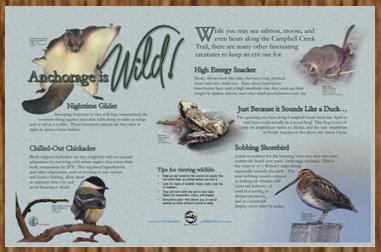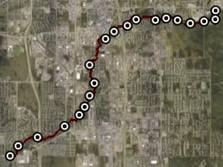Waldron Lake Display - 61° 10' 39" N, 149° 51' 1" W

■



|
 Visit the Trail Visit the Trail(Google Earth Required) |
 Site Navigation |
 
|
 
|
|
Waldron Lake Display - 61° 10' 39" N, 149° 51' 1" W |
 ■ |
|||||


|
||||||
|
|
Anchorage is Wild!While you may see salmon, moose, and even bears along the Campbell Creek Trail, there are many other fascinating creatures illustrated on the panel that you might want to keep an eye out for.Nighttime GliderSwooping from tree to tree with legs outstretched, the northern flying squirrel uses skin folds along its sides as wings and its tail as a rudder. These nocturnal animals are best seen at night in spruce forest habitat. Chilled-Out ChickadeeBlack-capped chickadees are tiny songbirds with an unusual adaptation for surviving cold winter nights: they lower their body temperature by 20°F. This regulated hypothermia and other adaptations, such as roosting in tree cavities and feather fluffing, allow them to minimize heat loss and avoid freezing to death. High Energy SnackerDusky shrews look like mice, but have long, pointed noses and very small eyes. Since these hyperactive insectivores have such a high metabolic rate, they must eat their weight in spiders, insects, and other small invertebrates every day. Just Because it Sounds Like a Duck...The quacking you hear along Campbell Creek from late April to mid-June could actually be a wood frog! This frog is one of only six amphibians native to Alaska, and the only amphibian in North America to live above the Arctic Circle. Sobbing ShorebirdListen in summer for the haunting 'woo woo woo woo woo' commonly heard over many Anchorage wetlands. This is the winnow of a Wilson's snipe diving repeatedly towards the earth. This eerie sobbing sound—created as rushing air vibrates stiff outer tail feathers—is used in courting, to distract predators, and as a territorial display, most often by males. Tips for viewing wildlife:
|